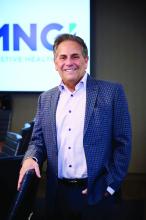What exactly is a healthy diet?
Scott Ketover, MD, AGAF, FASGE, will be the first to admit that’s not an easy question to answer. “As much research and information as we have, we don’t really know what a healthy diet is,” said Dr. Ketover, president and CEO of MNGI Digestive Health in Minneapolis, Minnesota. He was recognized by AGA this year with the Distinguished Clinician Award in Private Practice.
When patients ask questions about a healthy diet, Dr. Ketover responds with a dose of common sense: “If it’s food that didn’t exist in the year 1900, don’t eat it.” Your grandmother’s apple pie is fine in moderation, he said, but the apple pie you get at the McDonald’s drive-through could sit on your shelf for 6 months and look the same.
That is not something you should eat, he emphasizes.
“I really do believe though, that what crosses our lips and gets into our GI tract really underlies our entire health. It’s just that we don’t have enough information yet to know how we can coach people in telling them: eat this, not that,” he added.
In an interview, Dr. Ketover spoke more about the link between the gut microbiome and health, and the young patient who inspired him to become a GI physician.
Q: Why did you choose GI?
Dr. Ketover: I was a medical student working on my pediatrics rotation at Children’s Minnesota (Minneapolis Pediatrics Hospital). A 17-year-old young man who had Crohn’s disease really turned this into my lifelong passion. The patient confided in me that when he was 11, he had an ileostomy. He wore an ileostomy bag for 6 years and kept it hidden from all his friends. He was petrified of their knowing. And he told me at the age of 17 that if he knew how hard it was going to be to keep that secret, he would’ve preferred to have died rather than have the ileostomy. That got me thinking a lot about Crohn’s disease, and certainly how it affects patients. It became a very motivating thing for me to be involved in something that could potentially prevent this situation for others.
Today, we have much better treatment for Crohn’s than we did 30 years ago. So that’s all a good thing.
Q: Wellness and therapeutic diets are a specific interest of yours. Can you talk about this?
Dr. Ketover: We talk about things like Cheetos, Twinkies — those are not real foods. I do direct patients to ‘think’ when they go to the grocery store. All the good stuff is in the perimeter of the store. When you walk down the aisles, it’s all the processed food with added chemicals. It’s hard to point at specific things though and say: this is bad for you, but we do know that we should eat real food as often as we can. And I think that will contribute to our knowledge and learning about the intestinal microbiome. Again, we’re really at the beginning of our infancy of this, even though there’s lots of probiotics and things out there that claim to make you healthier. We don’t really know yet. And it’s going to take more time.



